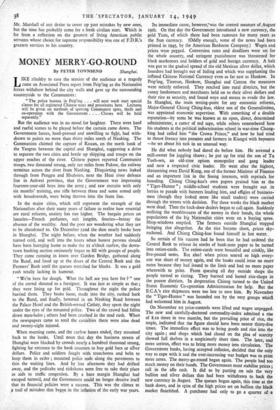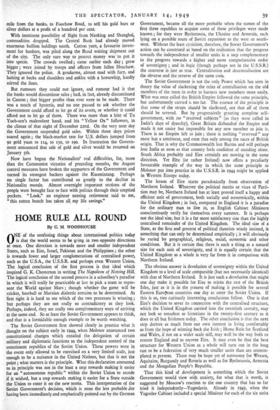MONEY MERRY-GO-ROUND
By PETER TOWNSEND Shanghai.
LIKE ribaldry to ease the tension of the audience at a tragedy came an Associated Press report from Peip'ing as the Nationalist forces withdrew behind the city walls and gave up the surrounding countryside to the Communists: "The police bureau in Peip'ing . . . will next week start special classes for all registered Chinese nuns and prostitutes here. Lectures will be given on methods of spotting Communist spies, thrift and co-operation with the Government . . . . Classes will be held separately."
But the audience was in no mood for laughter. There were hard and rueful scenes to be played before the curtain came down. The Government forces, hard-pressed and unwilling to fight, had with- drawn to points no more than thirty miles north of Nanking. The Communists claimed the capture of Kouan, on the north bank of the Yangtze between the capital and Shanghai, suggesting a drive to separate the two cities and bottle up shipping and troops on the upper reaches of the river. Chinese papers reported Communist troops, two thousand strong, only ten miles from Pukow, the railway terminus across the river from Nanking. Disquieting news leaked through from Pengpu and Hsuhsien, near the Huai river defence line in Anhwei province, that the Government was impressing fourteen-year-old boys into the army ; and raw recruits with only six months' training, one rifle between three and some armed only with broadswords, were being thrown into the front line.
In the major cities, which still represent the strength of the Nationalists after their many years of failure to realise how essential are rural reforms, anxiety has run higher. The bargain prices on luxuries—French perfumes, suit lengths, fineries—betray the absence of the wealthy. And the poor are wondering what they are to be abandoned to. On December 22nd the dam nearly broke here in Shanghai. The night before, when the weather had suddenly
turned cold, and well into the hours when honest persons should have been hurrying home to make the rt o'clock curfew, the down-
town banking section ominously began to fill with groups of people. They came running in knots over Garden Bridge, gathered along the Bund, and lined up at the doors of the Central Bank and the Farmers' Bank until the queues stretched for blocks. It was a gold rush totally lacking in humour.
" We're here for dough. What the hell are you here for ? " one of the crowd shouted to a foreigner. It was just as simple as that ; they were lining up for gold. Throughout the night the police harried them. They broke loose, made into the city, rushed back to the Bund, and finally, hemmed in on Nanking Road between the Palace Hotel and the British-owned Cathay, they spent the night under the eyes of the mounted police. Two of the crowd had fallen down man-holes ; others had been crushed in the mad rush. When the newspapers came to total the casualties there were nine dead and twenty-eight injured.
When morning came, and the curfew hours ended, they streamed back to the banks. Until noon that day the business streets of Shanghai were blocked by crowds nearly a hundred thousand strong, fighting for entrance to the bank counters to buy gold bars or silver dollars. Police and soldiers fought with truncheons and belts to keep them in order ; mounted police rode along the pavements to thin the waiting lines. And by late afternoon they had drifted
away, and the pedicabs and rickshaws were free to take their place as aids to traffic congestion. By a bare margin Shanghai had escaped turmoil, and the Government could no longer deceive itself that its financial policies were a success. This was the climax to A trail of mistakes that began in the inflation of the early war years.
Its immediate cause, however,"was the control measure of August 19th. On that day the Government introduced a new currency, the gold Yuan, of which there had been rumours for many years as the Sun currency. (Oddly enough, some of the notes had been printed in 1945, by the American Banknote Company.) Wages and prices were pegged. Conversion rates and deadlines were set for the whole country, and stringent punishment was Threatened for black marketeers and holders of gold and foreign currency. A halt was put to the gradual spread of the old Mexican silver dollar, which hoarders had brought out of hiding and which was supplanting the inflated Chinese National Currency even as far east as Hankow. In Peip'ing, Tientsin, Hankow, Shanghai and Canton the measures were strictly enforced. They reached into rural districts, but the canny landowners and merchants held on to their silver dollars and their rice as security, and found ways and means to evade the law. In Shanghai, the main testing-point for any economic reforms, Major-General Chiang Ching-kuo, eldest son of the Generalissimo, was appointed economic supervisor. With something of a double reputation—by some he was known as an open, direct, determined administrator, a cutter of red tape, while others remembered how his students at the political indoctrination school in war-time Chung- king had called him "the Crown Prince," and how he had tried to thrust literacy into peasants and farmers in Kiangsi with bayonets —he set about his task in an unusual way.
He did what nobody had dared do before him. He arrested a mill-owner for juggling shares ; he put up for trial the son of Tu Yueh-sen, an old-time opium monopolist and gang leader and now a respected civic leader. He went after the highest, threatening even David Kung, son of the former Minister of Finance and an important link in the Soong interests, with reprisals for hoarding. Chiang Ching-kuo's own papers praised him as the "Tiger-Hunter " ; middle-school students were brought out in lorries to parade with banners lauding him, and effigies of business- men (though they looked more like small traders) were carried through the streets with derision. For three weeks the black market went dead. Then the back-door dealers began to call again. Suddenly realising the worthlessness of the money in their hands, the whole populations of the big Nationalist cities went on a buying spree. Shop-windows emptied. The farmers outside Shanghai stopped bringing rice altogether. As the rice became short, .prices sky- rocketed. And Chiang Ching-kuo found himself in hot water.
So certain of his success had he been that he had ordered the Central Bank to release its stocks of bank-note paper to be turned into ration-cards. The ration-cards were beautiful and crinkly, like five-pound notes. But alas! when prices soared so high every- one was short of money again, and the banks could issue no more notes because they had issued to the limit and had no more paper wherewith to print. From queuing all day outside shops the people turned to rioting. They burned and looted rice-shops in the poorer districts. In desperation Chiang turned to the United States Economic Co-operation Administration for help. But the E.C.A.'s rice shipments were too late to save him. By November the "Tiger-Hunter " was hounded out by the very groups which' had welcomed him in August.
On November 1st price-controls were lifted and wages unpegged. The new and carefully-doctored commodity-index admitted a rise of 8.ro times in two months, but the prevailing price of rice, the staple, indicated that the figure should have been nearer thirty-five times. The immediate effect was to bring goods and rice into the city again ; and shops which had closed on the plea of scarcity showed full shelves in a suspiciously short time. The later, and more serious, effect was to bring more money into circulation. The Government banks, having accepted inflation, decided that the only way to cope with it and the ever-increasing war budget was to print more notes. The merry-go-round began again. The people had too much money on their hands. The Government must stabilise prices ; call in the idle cash. It did so by putting on sale the very bullion and silver dollars that had been withdrawn to back the new currency in August The queues began again, this time at the bank doors, and in spite of the high prices set on bullion the black market flourished. A purchaser had only to go a quarter of a mile from the banks, to Foochow Road, to sell his gold bars or silver dollars at a profit of a hundred per cent.
With imminent possibility of flight from Nanking and Shanghai, commodities dropped. The Central Bank had already moved enormous bullion holdings south. Cotton yarn, a favourite invest- ment for bankers, was piled along the Bund waiting shipment out of the city. The only sure way to protect money was- to put it into specie. The crowds swelled ; came earlier each day ; grew bigger ; were joined by troops and officers from fallen Hsuchow. They ignored the police. A gendarme, almost mad with fury, and lashing at backs and shoulders and ankles with a horsewhip, hardly stirred the lines.
But rumours they could not ignore, and rumour had it that the banks would discontinue sales ; had, in fact, already discontinued in Canton ; that bigger profits than ever were to be made. There was a touch of hysteria, and no one paused to ask whether the Government could afford to let go of its assets, or whether it could afford not to let go of them. There was more than a hint of Tu Yueh-sen's malevolent hand, and his " Yellow Ox " followers, in the climax of that night of December 22nd. On the very next day the Government suspended gold sales. Within three days prices soared again ; the black-market rate for U.S. dollars jumped from- 92 gold yuan to 114, to 15o, to 19o. In frustration the Govern- ment announced that sale of gold and silver would be resumed on January 5th.
Now have begun the Nationalists' real difficulties, for, more than the Communist victories of preceding months, the August control measures have broken the supporters of the Government and turned its strongest backers against the Kuomintang. Perhaps no single factor has contributed so greatly to the decline in Nationalist morale. Almost overnight important sections of the people were brought face to face with politics through their emptied pockets. "Look," an engineer nearing retirement said to me, " this rotten bunch has taken all my life savings."



































 Previous page
Previous page